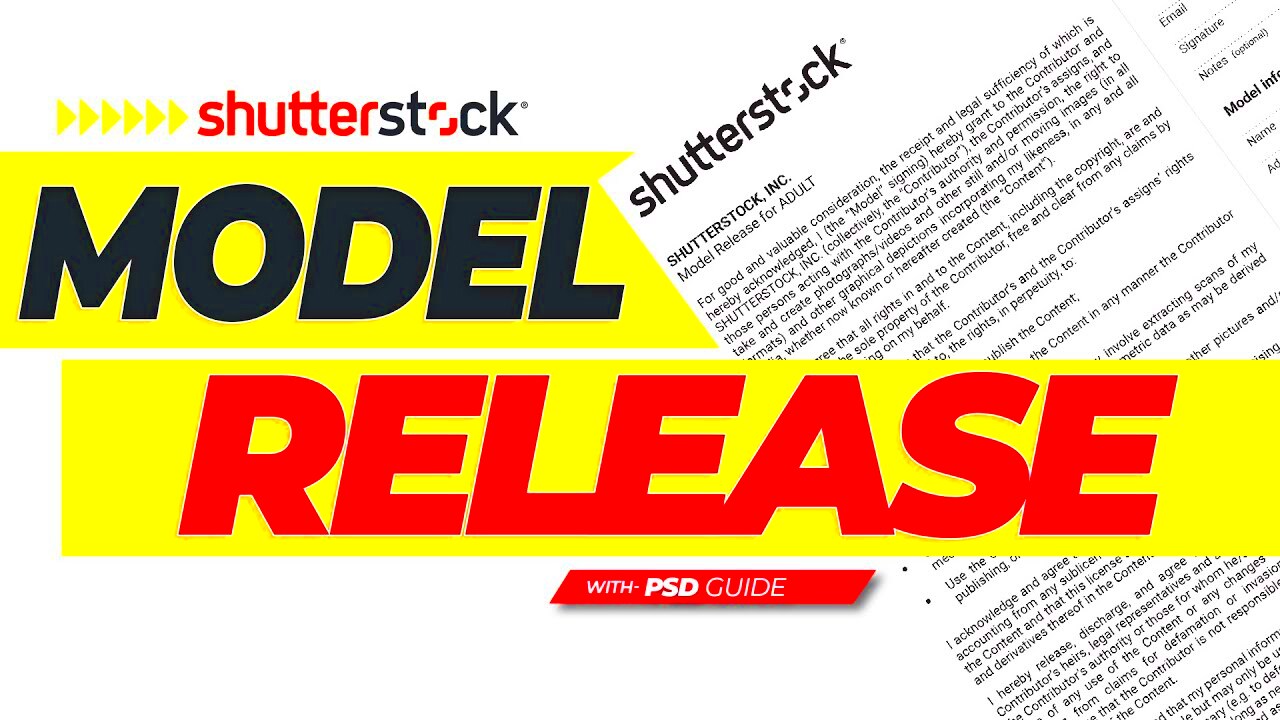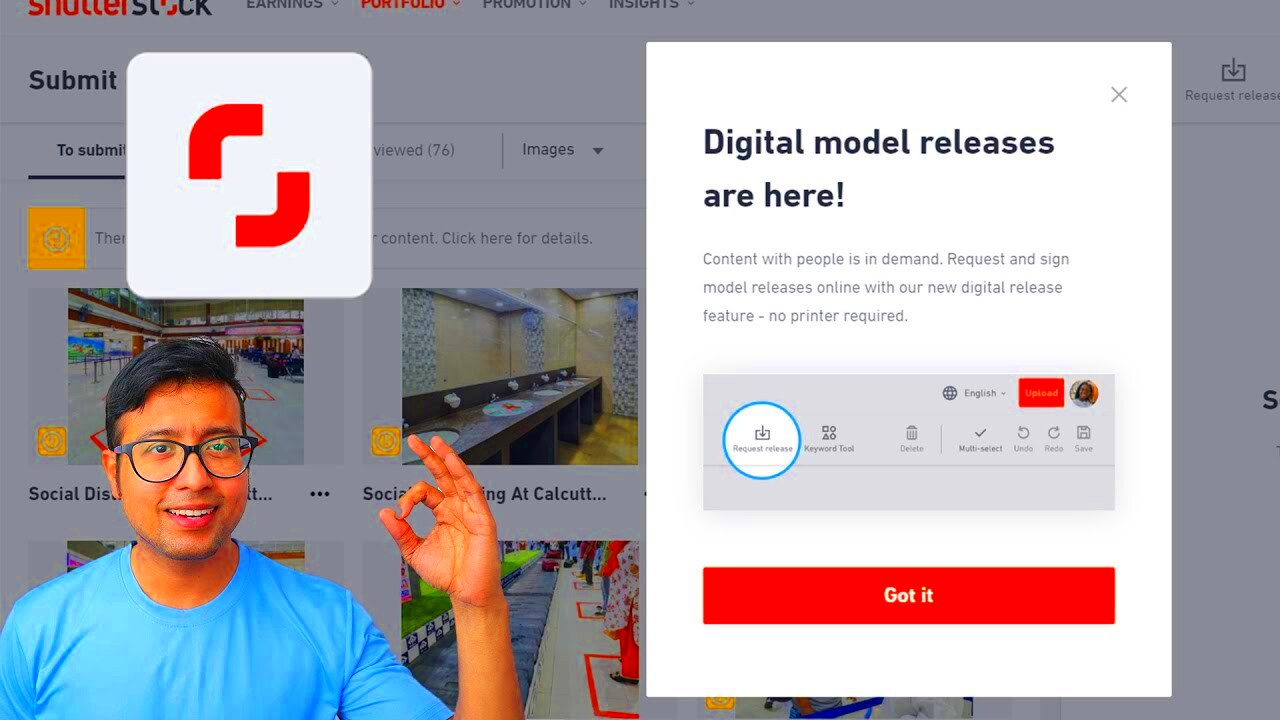When you venture into stock photography you may come across the term "model release." It sounds intimidating but it's important for anyone wanting to sell their photos. In essence a model release is a paper that gives the green light to use someone's face in pictures. It's like a handshake that ensures the person in your shot is on board with how their image will be used. If you're thinking about sharing pictures on
Shutterstock grasping this idea is crucial.
Understanding the Basics of Model Release

A model release is like an agreement between a photographer and the person posing for the photos. It gives the photographer permission to use the pictures in different ways. Here are the key points you should be aware of,
- Definition: A model release is a legal form signed by a person who appears in a photo, giving permission for their image to be used commercially.
- Who Needs It: Any photo featuring recognizable individuals requires a model release if you plan to use it for commercial purposes.
- When It’s Needed: Before you upload your photos to Shutterstock or any other stock photo site, ensure you have a signed model release for every person featured.
Based on what I've seen getting a model release can really make a difference. It's not just about covering yourself legally but also showing respect and being clear about things. I recall a situation where I forgot to get a model release and it resulted in some uncomfortable discussions. Preventing problems like that is precisely why this document is so important.
Why Model Release is Important for Shutterstock Images

When it comes to
Shutterstock and similar stock photo sites having a model release is essential not just a routine step. Here's the reason behind it.
- Legal Protection: Shutterstock needs to ensure that all images used on their platform are legally cleared. Without a model release, there’s a risk of legal action from the people in your photos.
- Commercial Use: Shutterstock licenses images for commercial purposes. A model release ensures that the people in your photos are comfortable with their likeness being used in advertisements, websites, and more.
- Trust and Credibility: Having a model release adds credibility to your submissions. It shows that you are a professional who respects the rights of individuals and follows legal protocols.
Through my experiences as a photographer, I’ve come to realize the importance of obtaining these releases. They protect not just your creations but also the relationships you establish with clients and platforms. It may seem like a gesture but it has a significant impact over time.
How to Obtain a Model Release for Your Photos
Getting a model release may appear challenging at first, but it can be easily handled with some assistance. Here’s a breakdown of how to go about it step by step.
- Prepare the Release Form: Start with a well-drafted model release form. You can find templates online or consult a legal expert to draft one tailored to your needs.
- Get Consent Before the Shoot: Always get verbal consent before taking photographs. Explain how the images will be used and ensure the model is comfortable.
- Explain the Details: Clearly explain the purpose of the model release to the person involved. Make sure they understand that it allows their image to be used commercially.
- Have Them Sign the Form: After the shoot, present the release form for signing. Ensure that it’s signed and dated. A digital signature is acceptable if you’re working remotely.
- Store the Release Form Safely: Keep a copy of the signed release form in a secure location. It’s good practice to have both digital and physical copies.
I recall starting out in photography and not bothering to obtain model releases for certain projects. This led to a few awkward discussions and lost chances. Believe me securing the release beforehand streamlines the process and adds a touch of professionalism.
Key Elements Included in a Model Release
To ensure a model release is legally binding, it is important to include specific details. Here are the key elements to incorporate
| Element | Description |
|---|
| Model's Full Name | The full legal name of the person appearing in the photo. |
| Contact Information | Address, phone number, and email of the model. |
| Description of the Photos | Details about the photoshoot and the specific images covered by the release. |
| Usage Rights | What types of commercial uses are permitted, such as advertising or online content. |
| Signature and Date | Model’s signature and the date when the release was signed. |
When I began utilizing releases I made it a point to incorporate these aspects into every document. It may seem like a hassle but the reassurance and professionalism it offers are well worth it. Each element contributes to transparency and safeguards for both sides involved.
Common Questions About Model Releases
Here are some common questions that could help clarify any uncertainties you may have regarding model releases
Do I need a model release for every photo?
- If the photo features a recognizable individual and will be used commercially, a model release is necessary.
Can a model revoke their release?
- Generally, a signed release is binding, but it’s best to check local laws as some regions might have specific regulations.
What if the model is a minor?
- For minors, a parent or guardian must sign the model release. Ensure you have proper consent from them.
Is a verbal agreement enough?
- While a verbal agreement can be a good start, a written model release is always preferred for legal security.
From what I've seen addressing these inquiries and maintaining dialogue with models goes a long way in preventing any mix ups. The key is to make sure that everyone involved feels valued and has a clear understanding of how their photos will be utilized.
How to Use Model Releases Effectively
Making use of model releases goes beyond simply obtaining a signature on a piece of paper. Its about seamlessly incorporating them into your process to safeguard both your creations and the individuals you capture in photos. Here are some suggestions to optimize the use of model releases.
- Maintain Proper Documentation: Store your signed model releases securely. Whether you prefer physical copies or digital files, make sure they are organized and easy to access. I’ve learned the hard way that having everything in order saves a lot of headaches down the line.
- Review the Release Periodically: If your model release includes a time limit or specific usage terms, review it periodically. This ensures that you remain compliant with any changes in how the images are used.
- Communicate with Your Model: Keep your model informed about how their images are being used. Regular updates can help maintain trust and ensure that there are no surprises regarding the usage of their likeness.
- Keep Legal Advice Handy: When in doubt, consult a legal expert to ensure your model releases are up to date and compliant with local laws. It’s a small investment for peace of mind.
- Educate Your Team: If you work with a team, make sure everyone understands the importance of model releases and follows the correct procedures. This avoids potential oversights and reinforces professionalism.
Throughout my photography journey incorporating these practices has not only safeguarded my work but also nurtured stronger connections with my models. Utilizing model releases effectively revolves around showing respect maintaining professionalism and protecting your creative assets.
Conclusion and Final Thoughts
Grasping and utilizing model releases is crucial for anyone involved in stock photography. It safeguards your creations legally and shows consideration for the rights of individuals you capture in photos. Through maintaining record keeping, fostering transparent communication and seeking legal counsel when needed you can navigate the intricacies of model releases confidently. Keep in mind that handling a model release not protects your work but also establishes trust and professionalism, in your photography endeavors.
 A model release is like an agreement between a photographer and the person posing for the photos. It gives the photographer permission to use the pictures in different ways. Here are the key points you should be aware of,
A model release is like an agreement between a photographer and the person posing for the photos. It gives the photographer permission to use the pictures in different ways. Here are the key points you should be aware of, When it comes to Shutterstock and similar stock photo sites having a model release is essential not just a routine step. Here's the reason behind it.
When it comes to Shutterstock and similar stock photo sites having a model release is essential not just a routine step. Here's the reason behind it.
 admin
admin








